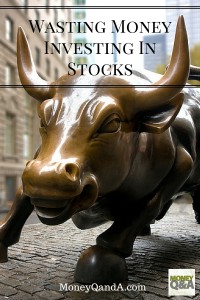The following is a guest post by Ben from YoungMoneyFinance.com about investing in the stock market. If you would like to write an article for Money Q&A, please visit our Guest Posting Guidelines.
A lot of us shy away from the stock market. It’s almost like we’re afraid of investing in the stock market. Sure, we know that we should invest our money, but a lot of us get nervous when it comes to doing so in the stock market. Too many ups and downs, too unpredictable.
Most of us write off our inexperience and lack of knowledge and decide to stay out of the market. However, we do spend a lot of time and energy on our fantasy football teams, and if you think about it, playing fantasy football isn’t all that different from investing in the stock market.
How Fantasy Football Is Like Investing In The Stock Market
LendEDU published the results of a very cool survey while we’re on the topic of fantasy football. Here are some of the interesting results…
-
The average season-long fantasy football player spends $286.84 on league-entry fees, while the average daily player (DraftKings, FanDuel) spends $272.52 on related fees.
-
The average player spends nearly 8 hours a week on fantasy football and 4.31 hours a week of work, or $1,186 in lost productivity if you factor in the U.S. median wage.
-
89.6% of season-long players expect a positive ROI this year, while 92.41% of daily players expect a positive ROI. Nothing wrong with a little confidence! Can we say confidence bias?
Just like managing a good stock portfolio…
1) Depth and diversification are key. A good fantasy team is made up of a number of different players, each playing a different role. A good stock portfolio also has different stocks playing different roles. You’ll have your growth stocks (ones you expect to grow in value) and your value stocks (less price appreciation but lots of dividends). You’ve invested in different industries, just as you wouldn’t have a team full of RBs.
2) You have your core players and ones you can easily trade. Your fantasy team is made up of several core players (what up Peyton!) and then your TBD players. Some weeks you’ll pick up a new player and give them a start or two and depending on how they do, you’ll either drop or keep them. Your core players, though, are your winners.
They’ve proven themselves time and time again and you’d never trade them. A good portfolio will have your winners and then stocks that you’re testing out. Don’t be afraid to buy a couple of stocks and then trade them out when they don’t live up to your expectations.
3) Perceived value. We each learn how to notice and pick up undervalued players when we see one. It earns us ultimate bragging rights. Conversely, we’re quick to trade a player while he’s still ‘hot’ when we know he’s going nowhere but downhill. Stocks are the same way.I’m always on the lookout for quality stocks that have taken a hit by the market. Perhaps some big investor has been trash talking them, or the company made a dumb mistake. It doesn’t mean they’re not a good company – rather, just that they are a good buying opportunity for me!




 Too many people are not investing. It’s especially true for millennials.
Too many people are not investing. It’s especially true for millennials.